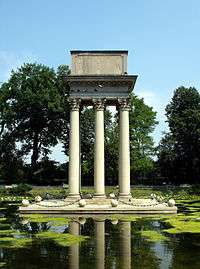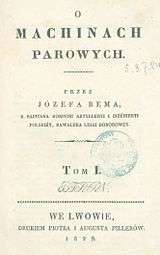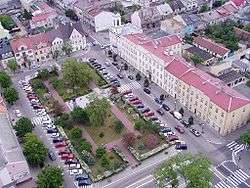Józef Bem
| Józef Zachariasz Bem Bem József | |
|---|---|
|
| |
| Born |
March 14, 1794 Tarnów, Kingdom of Galicia and Lodomeria (now Poland) |
| Died |
December 10, 1850 (aged 56) Aleppo, Ottoman Empire (now Syria) |
| Buried at | Tarnów (since 1929) |
| Allegiance |
Polish insurgents Revolutionary Hungarian Army Ottoman Army |
| Rank | General |
| Unit | Artillery |
| Battles |
Battle of Iganie (1831) Battle of Ostrołęka (1831) Battle of Temesvár (1849) Battle of Segesvár (1849) |
| Awards |
|
Józef Zachariasz Bem (Hungarian: Bem József, Turkish: Murat Pasha; March 14, 1794, Tarnów – December 10, 1850, Aleppo) was a Polish engineer and general, an Ottoman pasha and a national hero of Poland and Hungary, and a figure intertwined with other European nationalisms. Like Tadeusz Kościuszko (who fought in the American War of Independence) and Jan Henryk Dąbrowski (who fought alongside Napoleon Bonaparte in Italy and in the French Invasion of Russia), Bem fought outside Poland's borders for the future of Poland anywhere his leadership and military skills were needed.
Early life
Bem was born in Tarnów in Galicia, the area of Poland that had become part of the Habsburg Monarchy through the First Partition in 1772. After the creation of the tiny Duchy of Warsaw from the territories captured by Napoleon, he moved with his parents to Kraków, where after finishing military school (where he distinguished himself in mathematics) and joined the ducal forces as a fifteen-year-old cadet. Bem joined a Polish artillery regiment as a sub-lieutenant and then lieutenant in the French service, took part in the French invasion of Russia (1812), and subsequently distinguished himself in the defence of Danzig (Polish: Gdańsk) (January – November 1813), winning the Knight's Cross of the Legion d'honneur.
After the Congress of Vienna in 1815, the Duchy of Warsaw was transformed into the constitutional Kingdom of Poland, a dependent territory of the Russian Empire, and Bem became a teacher at a military college. There he carried out research on a newly designed rocket-like missile, publishing his research with extensive illustrations.
Bem became involved in a political conspiracy to restore Poland to full independence, but, when his membership in a secret patriotic organisation was discovered, he was demoted and sentenced (in 1822) to one year in prison. Although the sentence was suspended, Bem resigned his commission and moved to Galicia. In Galicia he researched steam engines and their application, and again published his results. Bem lived in Lvov (Ukrainian: Львів, Polish: Lwów) and Brody until 1830, where he planned to write a treatise on the steam engine.
November Uprising
When the November Uprising, a struggle for Polish independence, broke out on November 29, 1830, against Tsarist Russia, Bem immediately joined the Polish insurgents. He arrived in Warsaw, was given a major's commission and the command of the 4th Light Cavalry Battalion, which he led during the Battles of Iganie and Ostrołęka. During the Battle of Ostrołęka, Bem's forces bravely charged the Russian opponents. Although the Polish army suffered a serious defeat with a loss of 6,000 men, Bem's actions prevented the destruction of the entire army. For his valour on the battlefield, Bem was awarded the Virtuti Militari Golden Cross and promoted to the rank of Brigadier General. He was steadfastly against capitulation until the very end of the Uprising, during the desperate defence of Warsaw against Prince Paskievich (September 27, 1831). Nonetheless, the Polish army was eventually compelled to lay down arms on October 5, 1831, and crossed the Russian–Prussian partitional border under the command of General Maciej Rybiński in the Great Emigration.
First exile

Bem then escaped to Paris, where he supported himself by teaching mathematics. In France, he published his next work, on the National Uprising in Poland, in which he not only gave an appraisal of the 1831 insurrection, but also tried to present a programme for the continuation of the struggle for the country's freedom.
In 1833 he went to Portugal to assist the liberal Dom Pedro against the reactionary Dom Miguel, but abandoned the idea when it was found that a Polish legion could not be formed. In Portugal, he was the target of an assassination attempt, carried out by Russian agents.
1848 hero
A wider field for his activity presented itself in 1848 (along with the Austrian Revolution). First he attempted to hold Vienna against the imperial troops of Alfred I, Prince of Windisch-Grätz, and, after the capitulation, hastened to Pressburg (Hungarian: Pozsony, today Bratislava, Slovakia) to offer his services to Lajos Kossuth, first defending himself, in a long speech, from the accusations of "treachery to the Polish cause" and "aristocratic tendencies" ˙— which the more fanatical section of the Polish émigré Radicals repeatedly brought against him. He was entrusted with the defence of Transylvania at the end of 1848, and in 1849, as General of the Székely troops, he performed miracles with his little army, notably at the bridge of Piski on February 9, where, after fighting all day, he drove back an immense force of pursuers.
After relieving Transylvania he was sent to drive the Austrian General Anton Freiherr von Puchner out of the Banat region. Bem defeated him at Orşova on May 16, but the Russian invasion forced him to retreat to Transylvania. From July 12 to 22 he was fighting continually, but finally, on July 31, his army was annihilated by overwhelming numbers in the Battle of Segesvár (near Segesvár, now Sighişoara, Romania), Bem escaping only after feigning death. Yet he fought a fresh action at Nagycsür (now Romanian: Sura Mare, Romania) on August 6, and contrived to bring his fragmented army to the Battle of Temesvár (near Temesvár, now Timişoara, Romania), to aid the hard-pressed General Henryk Dembiński. Bem was in command and was seriously wounded in the last pitched battle of the war, fought there on August 9.
Second exile and death
On the collapse of the rebellion he fled to the Ottoman Empire, where he adopted Islam,[1] and served as Governor of Aleppo under the name of Murad Paşa/Pasha.
Character and legacy
Bem was a man respected for his courage and heroic temper, both of which were in contrast with his small stature. His influence is said to have been magnetic: although none of his Székely subordinates understood the language he spoke, most revered him. As a soldier Bem was remarkable for his excellent handling of artillery and the rapidity of his marches. In Hungarian, he is often referred to affectionately as "Bem apó", which roughly translates into "Grandpa Bem" or "Old man Bem".
A statue to his honour has been erected at Marosvásárhely (now Târgu-Mureş, Romania), but not for long time. He lives more enduringly in the verses[2] of the Hungarian national poet Sándor Petőfi, who fell in the fatal action of July 31, 1849 at the Battle of Segesvár. His remains were brought back to Poland in 1929 and laid to rest in a mausoleum in Strzelecki Park in the city of Tarnów.
The Hungarian Revolution of 1956 began on October 23 with a protest at the foot of the Bem Statue in Budapest.
Works

Józef Bem published also in German, Polish and French languages books about the history of Poland, technology and military aspects:
- Józef Bem – "La Pologne dans ses anciennes limites et l'empire des Russies" 1836
- Józef Bem - "Notes sur les fusées incendiaires"
- Józef Bem – "Erfahrungen über die Congrevischen Raketen" czyli (Doświadczenia z rakietami kongrewskimi) 1820
- Józef Bem – "O machinach parowych"
- Józef Bem – "Węgrzy i Polacy w dzisiejszym stanie Europy"
- Józef Bem – "O powstaniu narodowym"
Gallery
Budapest, Hungary
 Statue of Józef Bem in Budapest.
Statue of Józef Bem in Budapest. Close-up of statue
Close-up of statue Statue inscription – (I will) retake the bridge or perish, onwards Hungary! With no bridge, there is no fatherland
Statue inscription – (I will) retake the bridge or perish, onwards Hungary! With no bridge, there is no fatherland
Romania
 Bust in the Céhtörténeti Múzeum
Bust in the Céhtörténeti Múzeum
Poland

 Józef Bem Square and statue in Ostrołęka
Józef Bem Square and statue in Ostrołęka Józef Bem, Polish medallion ND by J. Misztela
Józef Bem, Polish medallion ND by J. Misztela- Statue in central Tarnów
 Bem Monument in Warsaw
Bem Monument in Warsaw Bem Monument in Łazienki
Bem Monument in Łazienki
References
- ↑ The Islamic World and the West, Christoph Marcinkowski, pg. 99
- ↑ Sándor Petőfi: The Transylvanian Army (Az erdélyi hadsereg) (in Hungarian)
| Wikisource has the text of the 1911 Encyclopædia Britannica article Bem, Josef. |
-
 This article incorporates text from a publication now in the public domain: Chisholm, Hugh, ed. (1911). "Bem, Josef". Encyclopædia Britannica (11th ed.). Cambridge University Press. In turn, it gives the following references:
This article incorporates text from a publication now in the public domain: Chisholm, Hugh, ed. (1911). "Bem, Josef". Encyclopædia Britannica (11th ed.). Cambridge University Press. In turn, it gives the following references:
- Johann Czetz, Memoiren über Bems Feldzug (Hamburg, 1850)
- Kálmán Deresnyi, General Bem's Winter Campaign in Transylvania, 1848–1849 (Hung.), (Budapest, 1896).